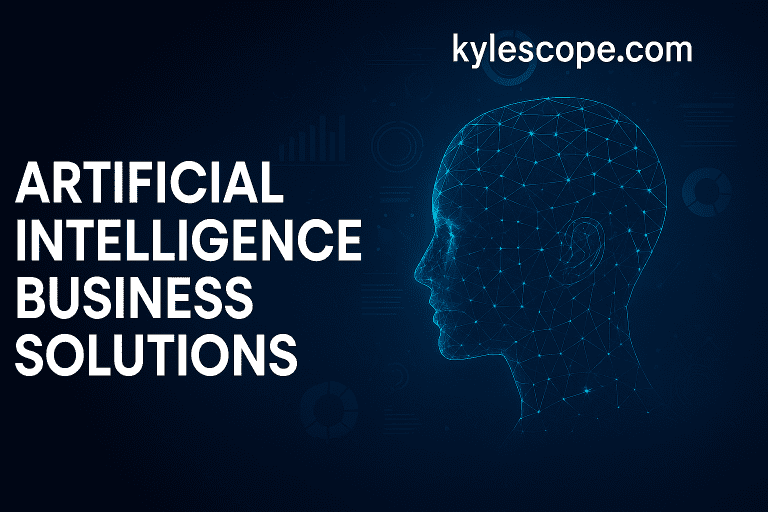
Artificial intelligence is paving the way for businesses to embrace technology at an unprecedented rate. AI use in business is therefore presenting viable solutions for common business problems, including poor customer service, operational inefficiencies, data overload, human resource acquisition problems, fraud detection, predictive maintenance, supply chain breakdown, marketing inefficiencies, e-commerce inefficiencies, and financial issues, among other problems. Therefore, artificial intelligence business solutions refer to the application of artificial intelligence tools such as machine learning, natural language processing, and computer vision to refine business aspects, enhance business productivity, and increase business value.
What are AI Business Solutions?
Artificial intelligence business solutions operate in an industry that sees the deployment of computer systems that imitate human qualities such as problem-solving, decision-making, and process optimization. These solutions influence several business processes, as highlighted above. At the most fundamental level, these tools enhance the workflow and make operations efficient. Businesses that work this way automate repetitive tasks, produce information using machine learning algorithms, acquire meaningful insights for vast amounts of data at the click of a button, and make predictions easily using up-to-date artificial intelligence business analytics.
An Overview of AI Business Solutions
Artificial intelligence in the domain of business provides intelligent programs that compute large data volumes and human knowledge. Such programs can help group data, perform analytics, create predictions, and find errors using interactive interfaces for conversation-style interactions in the business context. Therefore, AI is enabling computer systems to exhibit critical thinking skills akin to human beings in the business landscape. They utilize technologies such as machine learning, natural language processing, and deep learning to create business solutions. Business solutions emanate from the principles of the technologies elaborated below:
Machine Learning
These are algorithms that enable businesses to make predictions and data classifications. These algorithms train data sets to allow companies to identify patterns, point out anomalies, and make forecasts such as sales revenue, inventory needs, and so much more. Machine learning algorithms help with data mining, which is a process that allows businesses to derive meaningful insights that shape decision-making.
Deep Learning
Deep learning refers to a subdomain of machine learning that empowers task automation without necessitating human involvement. Some examples of deep learning include virtual assistants, chatbots, text recognition, and fraud prevention. Deep learning algorithms analyze information that captures user data or behaviors to make predictions. DL models are capable of extracting meaningful insights from unstructured data, including text, email, social media posts, audio files, video files, sensor data, log files, surveys, customer reviews, customer feedback, presentations, research notes, legal documents, and images.
Natural Language Processing
Natural language processing refers to a domain of artificial intelligence that empowers computer systems to identify, interpret, and create text of speech. Some popular examples of NLP include chatbots, virtual assistants, drive assistants, and many more. NLPs derive insights and information from unstructured data formats.
Computer Vision
Computer vision (CV) is a domain of artificial intelligence that empowers computer systems to derive information or insights from images, videos, and other media inputs. CV integrates machine learning along with deep learning to categorize and identify aspects of imagery. An example of the application of computer vision is in manufacturing processes to identify defects in product lines or manufacturing products.
How can AI be used for Business?
Businesses can utilize artificial intelligence in different departments and for numerous functions. As such, AI is a business accelerator with impacts across business areas. Below are some ways artificial intelligence can be used for business.
Artificial Intelligence Accounting Solutions
Artificial intelligence can help businesses generate cash flow projections, categorize transactions, apply taxes, manage payroll, and perform financial forecasting. Some of the additional benefits of artificial intelligence in accounting functions include the elimination of input errors, identifying duplicates and suspicious transactions, and recognizing avenues that save business resources, including money.
Content Creation including Writing, Design, Edition, Video, and so much More
Businesses can use avenues such as generative artificial intelligence in writing, conducting quick and intentional research, presentations, and making media, including videos, banners, posters, and so much more. Companies in the 21st Century do not have to rely on human inefficiencies while creating marketing campaigns, writing proposals, and making presentations. This is because there are free AI tools that can be used to solve business problems.
Customer Experience and Engagement AI Solutions
Businesses are embracing artificial intelligence tools like chatbots, callbots, and virtual assistants (AI-powered assistants) to optimize customer service for efficiency. Modern companies do not therefore have to put up with the inefficiencies of human operators entrusted with customer service. The AI-powered assistants are revolutionizing client interactions with companies or businesses. What is even interesting is that you can consult experts in artificial intelligence integration free of charge.
Cybersecurity AI Solutions
Businesses can also embrace AI-powered cybersecurity tools to evaluate system activity and protect against cyber threats. These systems can recognize cyber risks and analyze systems for vulnerabilities. The decision-makers in a business can therefore make informed decisions based on thorough risk analysis and accelerate threat response.
Information Technology AI Solutions
Modern businesses can benefit from AIOps (artificial intelligence in IT operations). These systems restructure data and IT infrastructure through the automation of repetitive or tedious tasks, including performance observation, workload scheduling, and data backup. The AI tools provide improved and interactive insights for common and sophisticated causes of IT system anomalies and errors. Businesses can therefore troubleshoot problems and anticipate their occurrence.
Financial Analysis AI Solutions
Businesses consisting of finance and business departments can integrate financial analysis AI solutions, which can perform numerous finance functions. The functions include bookkeeping such as transaction categorization, account reconciliation, financial statement generation, and invoicing functions such as data extraction, matching invoices with purchase orders, and automatic approvals. The other functions include fraud detection functions such as suspicious pattern recognition, credit scoring, risk assessment, and financial forecasting functions such as cash flow prediction, revenue trends, and budget variance; expense management functions such as expense categorization, policy enforcement, and reimbursement, tax compliance functions such as deduction identification, flag compliance, and filings preparation. Additional financial functions include portfolio management through asset allocation, portfolio rebalancing, performance tracking, algorithmic trading, and financial customer service.
Human Resources Management (HRM) AI Solutions
Artificial intelligence can enhance human resource management. Some of the HRM functions enhanced through AI include recruitment and talent acquisition functions such as screening resumes, candidate ranking, and job fit determination, candidate sourcing, interview scheduling and coordination, on-boarding automation, employee engagement analysis, performance management through KPI analysis and feedback suggestion, learning and development, payroll and benefits administration, attrition prediction, and human resource chatbots or virtual assistants.
Legal AI Solutions
Artificial intelligence provides an improved basis for using data during legal processes through its ability to analyze large volumes of data. Some of the legal processes that artificial intelligence can perform exceptionally well at include contract reviews and analysis to identify critical major clauses, flags, and compliance. Other functions include contract drafting, legal research, compliance monitoring, e-discovery, IP management, risk assessment, litigation prediction, document automation, and the provision of legal chatbots.
Sales and Marketing AI Solutions
Businesses that have sales and marketing departments can integrate artificial intelligence into key areas of their operations, including customer relationship management, email marketing, social media, and advertising. Artificial intelligence can enhance efficiency in making beneficial interactions that translate into profits for businesses. Some of the specific aspects that can leverage artificial intelligence include lead scoring, lead prioritization, sales forecasting, CRM automation, sales coaching, and quote and proposal generation. Other elements include upselling, customer segmentation, content generation, email marketing optimization, ad targeting, social listening, SEO optimization, marketing analytics, customer journey mapping, and so many more.
Supply Chain and Logistics AI Solutions
Businesses are embracing supply chain and logistics AI solutions that help with inventory management, forecasting, and automation. The specific tasks leveraging AI include demand forecasting, inventory optimization, supplier risk assessment, procurement automation, and supply chain visibility. Additionally, AI can help with scenario planning, scenario simulation, route optimization, fleet management, warehouse automation, delivery time prediction, and logistics cost optimization. Lastly, it can help with returns management, cargo risk detection, customs, and compliance automation.
AI Business Solution Use Cases
Data Analysis and Insights
Businesses operating with artificial intelligence can collect, clean, analyze, visualize, and perform predictions on large amounts of current and historical data through AI Analytics and Insights. These businesses can therefore make informed decisions, capture unique insights, and establish future trends or behaviors. As such, the decision-makers in business can make optimal decisions concerning their customers, offerings, and directions that correspond with future business objectives.
AI Automation to Enhance Business Processes
Artificial Intelligence Automation refers to the empowerment of humans to handle repetitive tasks without human involvement. Some of the concepts used in AI automation include machine learning, natural language processing, and predictive analytics to create superior systems. Therefore, artificial intelligence may automate repetitive tasks, including invoice processing, document management, data entry, and data validation. Other business tasks it can perform include resume screening, employee onboarding, performance analysis, lead scoring, and email campaign optimization. Moreover, it can also help with customer segmentation, demand forecasting in supply chain management, order processing, logistics optimization, and sentiment analysis. Lastly, it can do ticket routing, expense reporting, fraud detection, budget forecasting, real-time reporting, predictive modeling, and prescriptive analytics, among others.
Business Personalized Recommendations and Targeting
Artificial intelligence can analyze information presented in Excel sheets, customer relationship management (CRM), web forms, email marketing campaigns, survey tools, social media analytics, ecommerce platforms, mobile applications, customer support systems, and website analytics tools, among others. These AI tools can extract similarities corresponding with preferences and purchase behaviors as they segment customers. Therefore, businesses benefit from offering customers personalized recommendations and messaging based on specific audiences.
How much does AI Business Solutions Cost?
AI business solutions cost anywhere between $10 and $20,000, depending on project complexity. A single project may cost somewhere between $30 and $50 per hour. The costs are likely to change in the future due to advancing technologies. What is interesting is that you can consult artificial intelligence experts to determine the scope and complexity, and to determine an affordable cost.
Are you Looking to Implement AI Business Solutions?
Share your details below and receive a free quote and consultation
